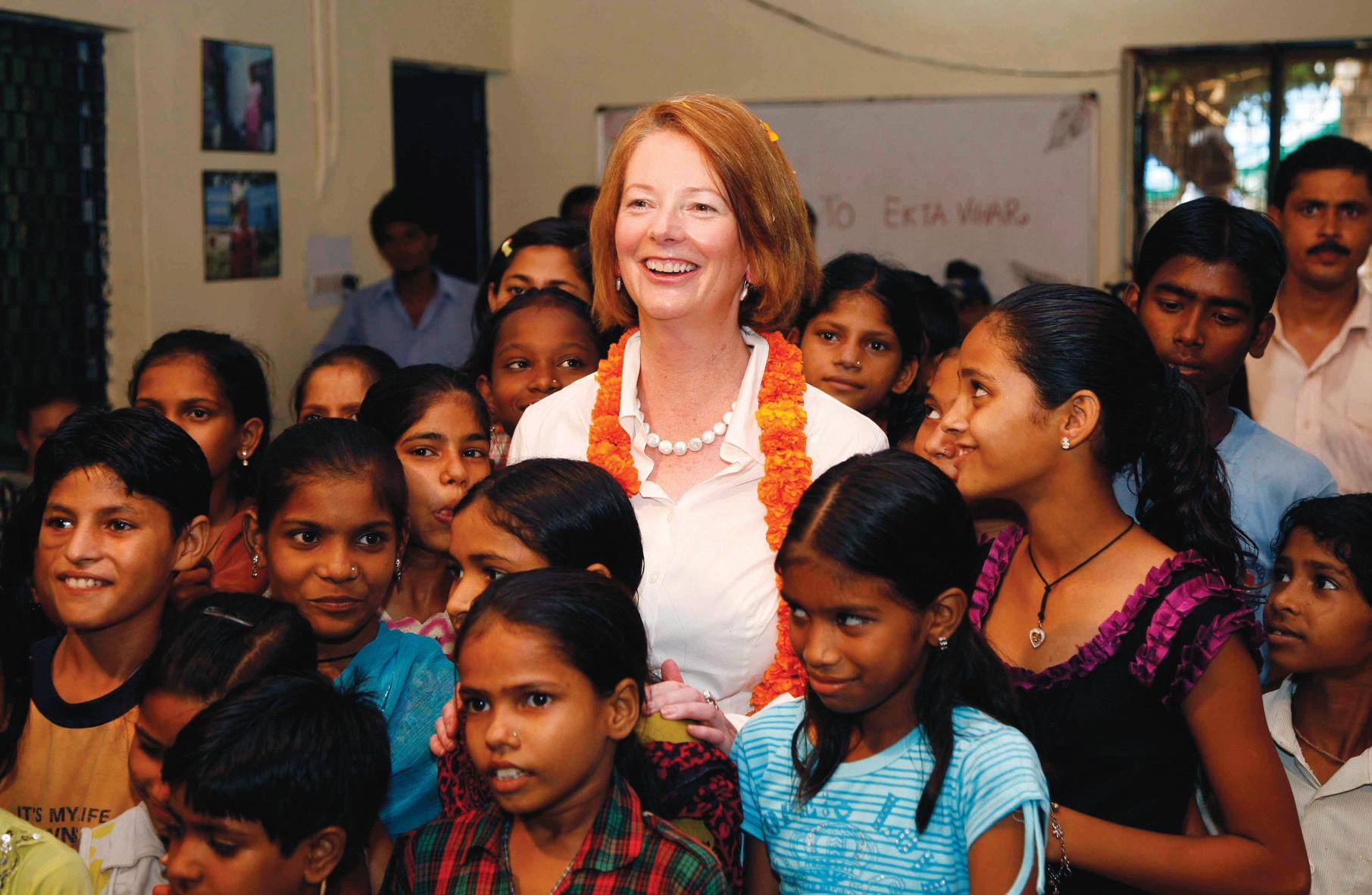
4 minute read
‘Come to Australia, it’s safe’ Julia Gillard to Indian students
from 2009-09 Sydney (1)
by Indian Link
Allaying fears that Australia is a racist country, Deputy Prime Minister Julia Gillard reassured the Indian student community of Australia’s safety record and appealed to them to come and study here.
Beginning her five-day visit to India on Aug 31 in a bid to boost bilateral ties in fields ranging from business to education, she met with Human Resource Development Minister Kapil Sibal and addressed students of the prestigious Lady Sri Ram College on her first day.
“We welcome Indian students to Australia. We have zero tolerance towards violence. We are more or less a much accepting and safe society,” the deputy prime minister told reporters after her two engagements.
“Australia has zero tolerance towards violence against Indian students... (we want) they should be safe, get quality education and enjoy their stay.”
Her comments come in the backdrop of many alleged racial attacks on Indian students in Australia that forced New Delhi to take note of the situation. External Affairs Minister S.M. Krishna made a five-day trip to Australia last month to interact with top government officials about the security and safety of students.
Gillard said the Australian police have arrested a “number of people” and they would be brought to justice.
In her meeting with Sibal, the minister briefed him about the steps initiated by the Australian government to provide safety to Indian students.
Gillard said Australia is bringing in legislation that would spell out stricter safety procedures for international students.
The principal aim of her visit, Gillard stressed, was to reinforce Australia’s image as “a culturally diverse, welcoming and safe country for Indian students, business people and other visitors”.
“After the legislation comes to effect, (we will ensure that) any institution providing education will be offering only quality education. The information provided by educational agencies should also be accurate,” she said, adding a hotline had already been set up for aggrieved students.
The Australian government is presently conducting an audit of its rapidly burgeoning vocational sector, one of the biggest education providers for Indian students but which is also widely believed to be misused for gaining permanent residency status.
Policymakers and educationists believe that the over 1,000 vocational institutes in the country, of which 400 alone are in Victoria state, have become moneymaking machines, and many of them compromise on the quality of education by hiring agents who are given hefty commissions.
Also in place, Gillard insisted, was a “visible police patrol”, especially in places from where racial attacks have been reported in the remote suburbs of major cities like Melbourne and Sydney.
“As a national government we are working with state governments to provide quality education to all Indian students. After my visit here, there will be a roundtable with foreign students on difficulties faced by them,” she added.
Australia’s education industry has boomed in recent years to become the country’s third largest export earner after coal and iron ore, generating about $12 billion in revenue in 2008.
Australia-India Institute launched
In what was a highlight of Ms Gillard’s visit, she announced a funding of $8.1 million for setting up the Australia-India Institute at the University of Melbourne.
Gillard said that Melbourne University, along with University of New South Wales and La Trobe University, will invest another $2 million to bring the total investment in the project to $10 million over the next three years.
Describing the institute as a “national epicentre” of information on India, an Australian High Commission communiqué said, “The institute will support research, graduate training, executive briefings and policy advice for the benefit of both countries... It will provide consultancies on issues of national priority, and host international conferences, community engagement and cultural dialogues”.
According to Gillard, the institute will look at several areas of priority research, such as environment, education, regional relationship and health.
It will also work closely with the AustraliaIndia Business Council to support mutual trade and investment.
Indian arm of Australian inter-faith centre launched Australia will improve its understanding of the Muslim world with the launch of an Indian arm of the University of South Australia’s International Centre for Muslim and Non-Muslim Understanding to leverage India’s experience in the area, Deputy Prime Minister Julia Gillard said during her visit to India.
The goal is to “build a worldwide community of outstanding scholars with a commitment to understanding and exploring the cultural and sociological factors that influence Muslim and non-Muslim relationships,” Gillard said at the launch of the centre on the third day of her visit.
“There is expertise here and in many countries across the Asian region that we can learn from,” she pointed out, adding the international launch of the centre was “appropriate because India is a nation that lives with difference on a grand scale and thrives”.
Gillard said the centre would emphasise international engagement, with an international advisory board and a council of distinguished scholars.
Educationist Pal Aluwalia, who is leading the foundation of the centre, said he hoped Indian candidates would apply for the 10 doctorate scholarships worth nearly Rs.1 million it was offering.
“I am hoping to welcome strong applications from India that can build long-lasting bilateral research relationships between Australia and India in this vital area,” she added.
Australian varsity, IGNOU to train Indian primary teachers
The Deputy PM also saw the Queensland University of Technology (QUT) join hands with the Indira Gandhi National Open
University (IGNOU), to train elementary teachers in rural India and to help the country attain universal primary education.
The teachers training program will be conducted through IGNOU centres across the country, authorities of the Queensland University of Technology (QUT) said.
Speaking at the program launch, Ms Gillard said: “This joint collaboration between IGNOU, the world’s biggest university, and QUT will help India attain its goal of universal primary education. It will transform primary school classrooms across the country, as the focus will shift from teaching to learning.”
QUT deputy vice chancellor Arun Sharma added: “We have developed the curricula for the diploma programme on teachers training. Initially we will start our work from Bihar.” Sharma, who hails from Bihar, said while India will benefit from the programme, Australia too will learn new things that can be implemented back home.
IGNOU Vice Chancellor V.N. Rajsekharan Pillai said: “There is an urgent need for two million new teachers in the country. A big gap exists between the demand and supply for quality teachers. This collaboration would help the cause.”
Both universities also signed agreements for two more courses - the Dual Doctoral Program for Research and Teaching Assistantships and an online programme in Master of Intellectual Property Law (MIPL).











